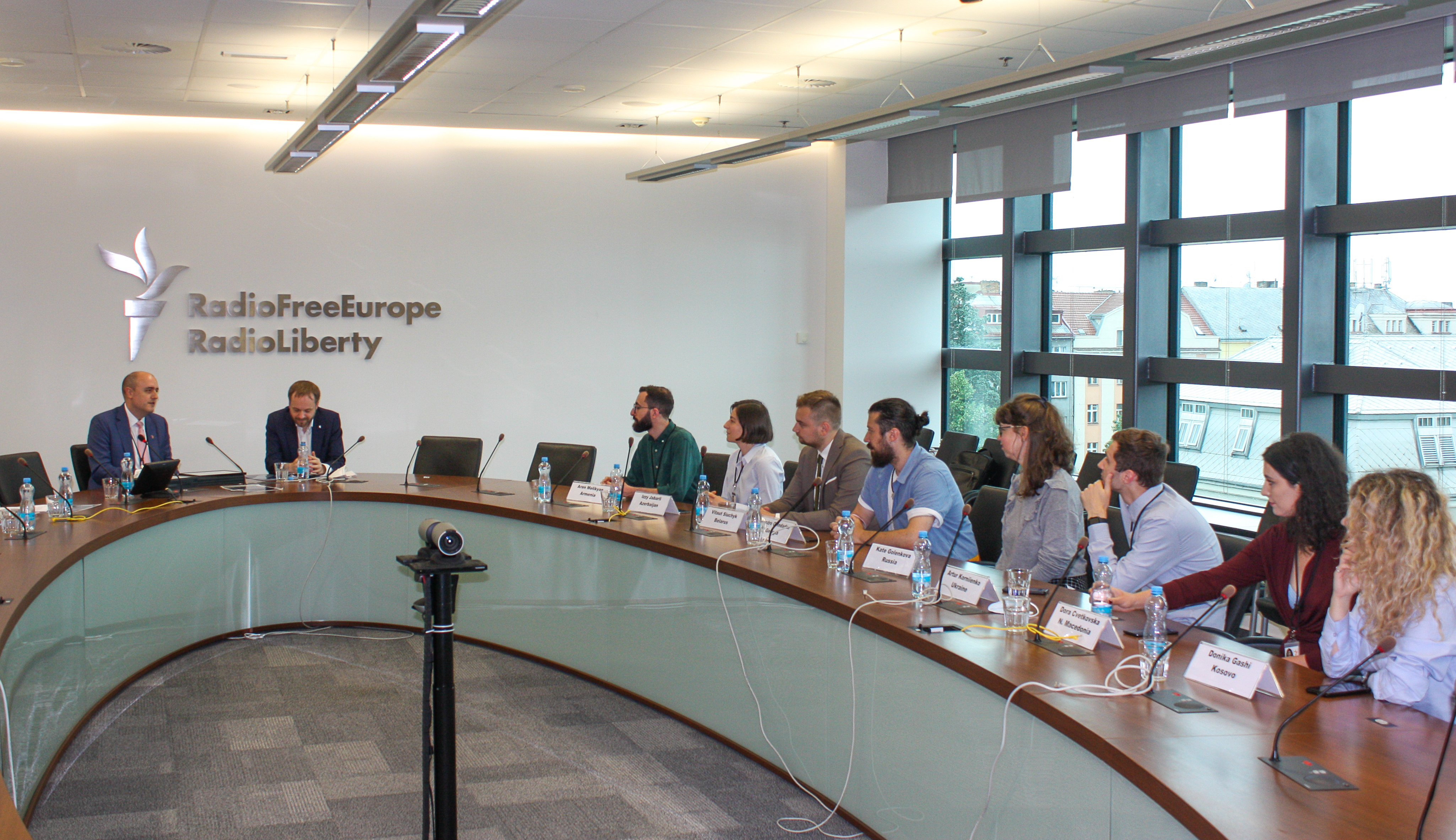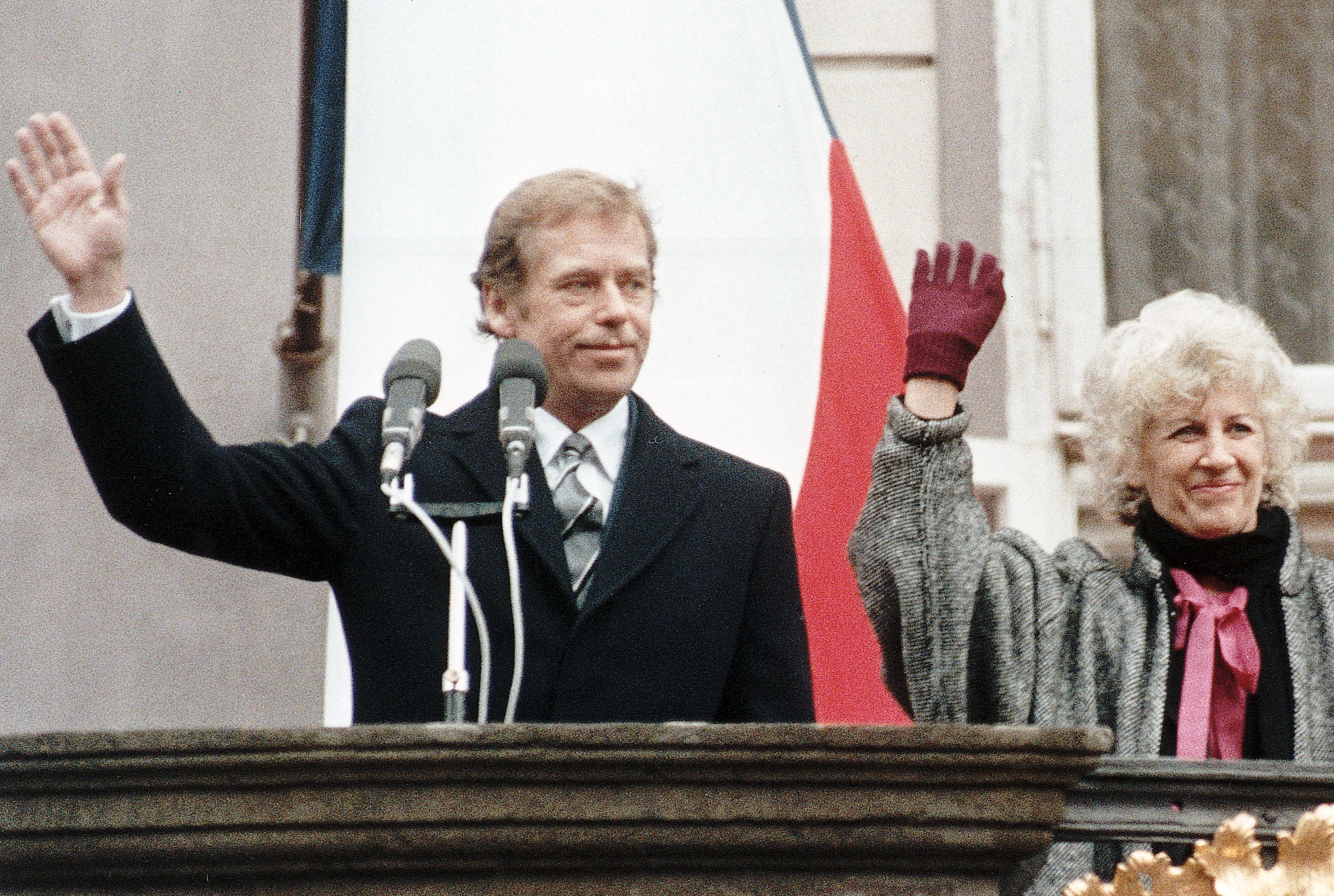Vaclav Havel Journalism Fellowship
The Vaclav Havel Journalism Fellowship is available to aspiring, independent journalists from Eastern Europe. The purpose of the Fellowship is to help journalists from the region pursue their profession in support of media pluralism and independence.

About the fellowship
Description
Launched in 2011, the Vaclav Havel Journalism Fellowship is inspired by the late Czech president’s belief in the transformational role of journalism in challenging tyranny and oppression and builds on RFE/RL’s legacy of promoting more open societies through journalism. The Fellowship is a joint initiative of the Ministry of Foreign Affairs of the Czech Republic and RFE/RL.
The Fellowship is a seven-month program, which equips Fellows with cutting-edge journalistic skills and involves them in the daily editorial debates and discussions that inform a professional and independent press. Fellows spend six months at RFE/RL’s headquarters in Prague, where they are placed with an appropriate language service to receive daily, on-the-job training and mentoring while working alongside RFE/RL’s seasoned professionals. After Prague, Fellows spend a final month at a local RFE/RL bureau (if applicable).
The main components of the program are:
- professional mentoring alongside RFE/RL’s seasoned professionals
- training and development of journalistic skills on traditional, multi-media, and digital platforms
- participation in the daily editorial discussions that inform a professional and independent press
- understanding of the mission and practice of a professional, free, and independent media company
The Fellowship also features workshops on journalistic practices and tools; discussions with government officials, civic leaders, and regional analysts; visits to media outlets and news agencies; and professional development opportunities in the Czech Republic and abroad. Fellows will be expected to represent themselves and the Fellowship in English at events and in discussions relating to media freedom in their country.
A monthly stipend in Prague and at the bureau, a housing allowance, health insurance, and travel costs shall be provided.
RFE/RL may change or cancel the Fellowship if circumstances unexpectedly arise that require such action. In the event that the Fellowship is changed or canceled, RFE/RL shall not be responsible for any resulting costs borne by the Fellow or any third party.
Eligibility
TThe Fellowship accepts applications from journalists from Armenia, Azerbaijan, Belarus, Georgia, Moldova, Ukraine, and the Russian Federation. In the cases of Belarus and Russia, only journalists living outside of these two countries can apply.
Eligible applicants should
- have a minimum of two years’ experience working as a journalist in their native language
- be committed to working as a journalist in, or for audiences in, their home country
- share RFE/RL’s mission
- have a working knowledge of English
How to apply
Application
Fellowships are awarded on a competitive basis. A complete application includes the following materials:
- curriculum vitae, including current contact information
- personal statement
- 2 letters of recommendation
- 3 work samples
- message to Vaclav Havel
Application materials must be submitted in English.
Shortlisted candidates will be contacted and asked to participate in an online interview as part of the application process.
In addition, please let us know how you learned about the Fellowship (e.g., RFE/RL’s website, Facebook, a professional or academic reference, etc.).
Important Dates
Fellowship term: March 2, 2026 – September 30, 2026
Application opens: September 3, 2025
Application deadline: October 3, 2025
Selection results announced by: October 31, 2025
Privacy Notice for RFE/RL Fellows
Fellowship at RFE/RL is contingent upon the successful completion of a background security check performed after the acceptance of RFE/RL’s offer. More details and information about the collection and processing of your personal data will be provided to you together with the Fellowship agreement.
Curriculum Vitae
Please attach your updated curriculum vitae. This shall include your name, email address, social media profiles, phone number, present address, and permanent address; a detailed work history since completing your formal education; and educational background. Please also list any noteworthy distinctions or awards, and current or recent memberships in professional, political, or other groups. Please also state if you have received any type of certification (and at what level) of English language proficiency.
Personal Statement
Your personal statement is a very important part of your application and will be closely read and considered in the selection process. It should be written in English and not exceed 750 words. In your personal statement, please describe your journalistic experience, including your reasons for pursuing journalism; the values and convictions that guide your work; experiences that have influenced your journalism; and what you hope to accomplish as a journalist. In addition, please explain your reasons for applying for the Vaclav Havel Journalism Fellowship and what you hope to gain from it. You are also encouraged to briefly describe your idea for a personal project, which will be completed during the Fellowship.
Letters of Recommendation
Two letters of recommendation are required with your application. One of the letters should be from a current supervisor or colleague who practices journalism and knows you professionally. The writers should explain their relationship to you and describe your qualifications, potential for professional growth and development, and reasons that make you an excellent candidate for the Fellowship. Letters must be submitted in English.
Work Samples
Please attach 3 work samples, on any platform, demonstrating your best professional work. Two of the samples must have been published within the year of the application deadline. All samples must include a date and, if not in English, they must be accompanied by an English translation. In the case of video submissions, an English-language summary is sufficient. If translations are not your own, please state so.
Message to Vaclav Havel
What message about media freedom, democracy, and human rights in your country would you convey to Vaclav Havel? Feel free to be creative and use any format, including video.
About Vaclav Havel
Vaclav Havel served as the first post-revolutionary president of Czechoslovakia from 1989, and as the first president of the Czech Republic from 1993. He was also a renowned playwright, poet, and essayist. During his time as president of Czechoslovakia and the Czech Republic, Havel used his position of influence to speak out as an unyielding advocate for democratic voices the world over. Long a listener and supporter, Havel invited RFE/RL to take up residence in Prague in 1995, planting RFE/RL’s headquarters in a city where its broadcasts were once banned.

Former Fellows
Kateryna Farbar (2025)
Yaroslava Tymoshchuk (2025)
Polina Kolesnikova (2025)
Shota Kincha (2025)
Vera Monina (2025)
Roza Mammadova (2025)
Mkrtich Karapetyan (2025)
Julia Alekseeva (2024)
Cristian Bolotnicov (2024)
Anton Kokaia (2024)
Katya Mamyan (2024)
Iryna Matviyishyn (2024)
Daria Zakharova (2024)
Yuliia Bondar (2023)
Aliona Ciurca (2023)
Kateryna Hatsenko (2023)
Luka Pertaia (2023)
Vasilina Sakalouskaya (2022)
Valeryja Ulasik (2022)
Nicoleta Stavila (2022)
Vazha Tavberidze (2022)
Egor Fedorov (2022)
Kateryna Lykhohliad (2022)
Aren Melikyan (2021)
Izzatkhanim Jabarli (2021)
Vitaŭt Siŭčyk (2021)
Sandro Gvindadze (2021)
Ekaterina Golenkova (2021)
Artur Korniienko (2021)
Anastasiya Boika (2020)
Eugen Muravschi (2020)
Marina Bocharova (2020)
Fylyp Lebediev (2020)
Gulnar Salimova (2019)
Hermine Virabyan (2019)
Tornike Mandaria (2019)
Victoria Colesnic (2019)
Karina Merkuryeva (2019)
Natalia Kondrashova (2018)
Glib Zhavoronkov (2018)
Mahmud Musalı (2018)
Salome Apkhazishvili (2017)
Stefan Grigorita (2017)
Ksenia Churmanova (2017)
Yaroslava Kutsai (2017)
Anush Muradyan (2017)
Anastasia Piliuhina (2017)
Veaceslav Ceban (2017)
Viktoriia Zhuhan (2017)